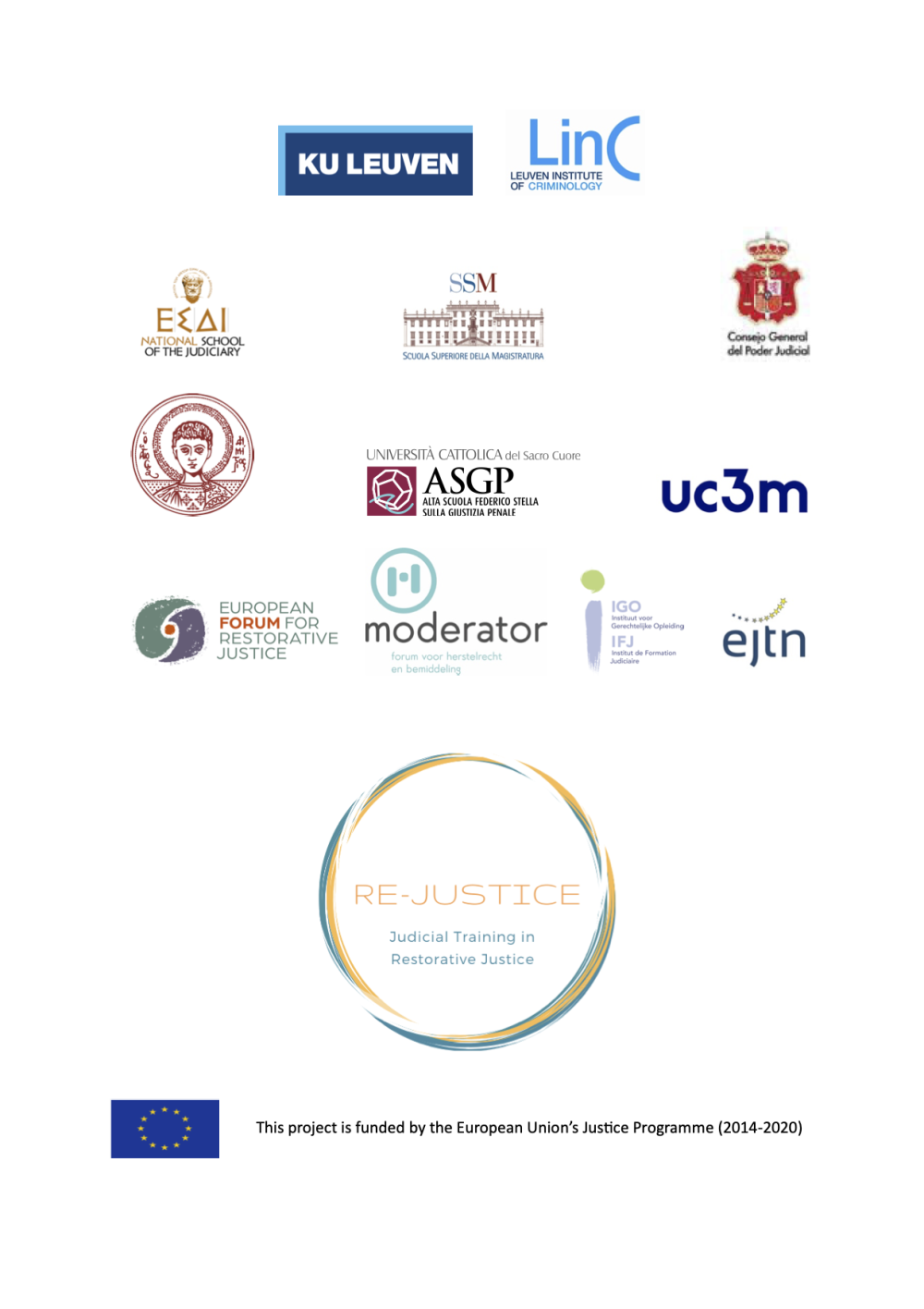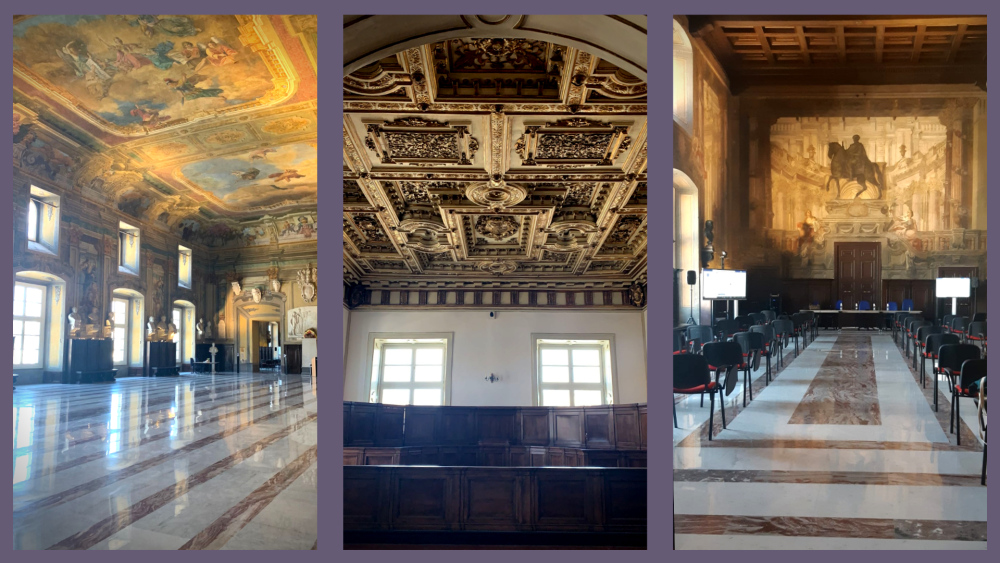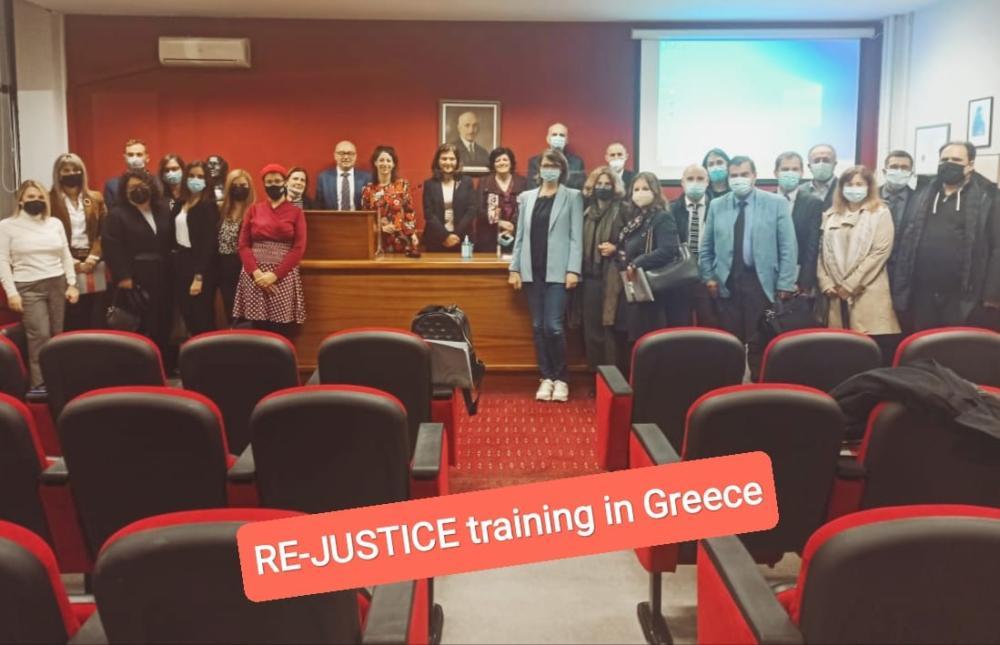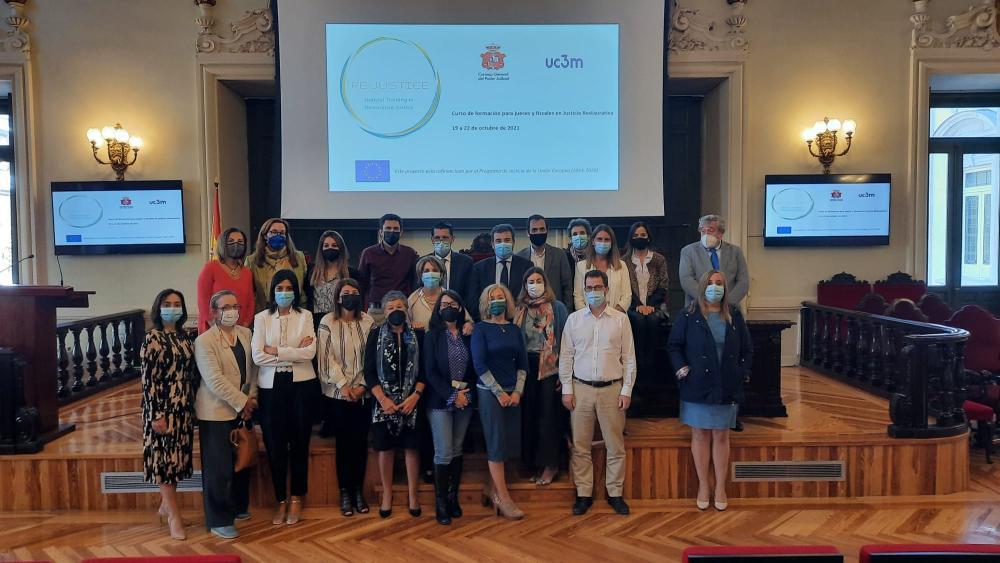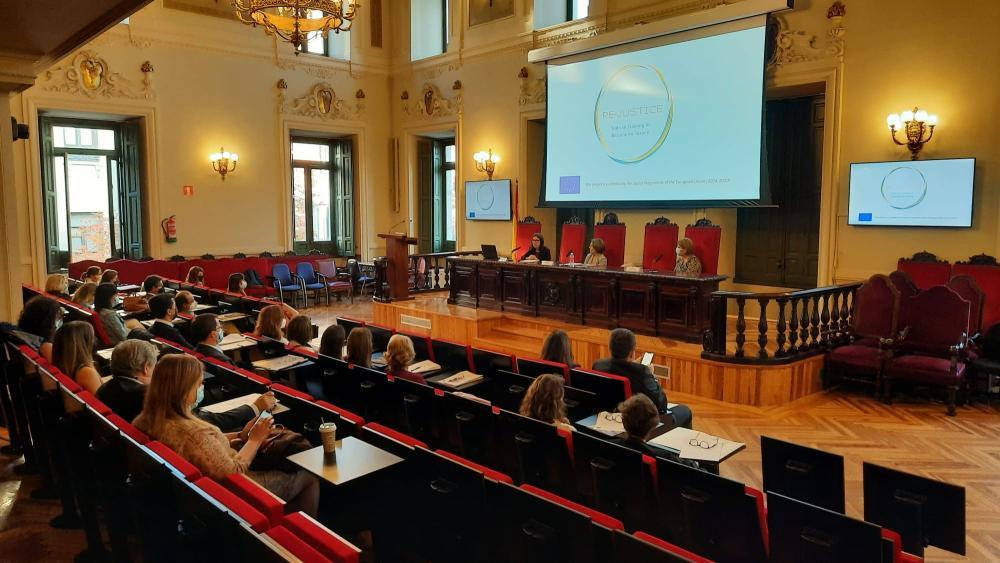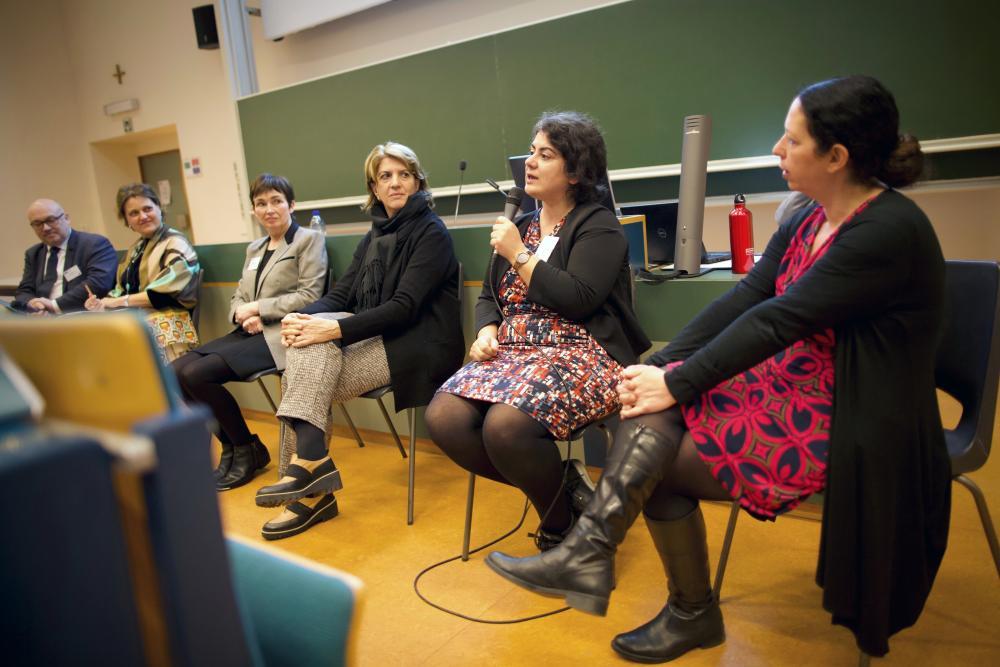According to the European Commssion Study of the Best Practices in the Training of Judges and Prosecutors in EU Member States, the training cycle should always be composed by 4 steps or phases: 1) Training-needs assessment; 2) Design of the specific training objectives (directly connected to the identified specific needs); Plan and design the training programme; 3) Implement the training programme and 4) Evaluate the training delivered (Cooper, 2015:52). In our training project, these four steps or phases of the training cycle inform the main objectives and can be retraced in the main activities, milestones and outputs that you can follow below.
Competency profile (Dec 2019): a competency profile on restorative justice for judges and public prosecutors has been developed at the very beginning of the project. With “competency profile” we refer to the specific collection of knowledge, skills and attitudes that has been compiled for judges and public prosecutors in the European context, but with a particular focus on the needs of these professionals in Greece, Italy and Spain with respect to an effective implementation of restorative justice. Identifying a wide range of relevant knowledge, skills and attitudes, the competency profile is the foundation for developing a training curriculum on restorative justice for these two categories of professionals. It is also key when considering the need for harmonisation of quality standards with respect to the professional, respectful and safe treatment of victims according to the Victim’s Directive.
Assessment of training needs on restorative justice (January – July 2020): a guidance framework, based on the development of the competency profile on restorative justice, was provided for the training needs assessment of each professional group, in Spain, Italy and Greece. Using this guidance framework, the training needs assessment on restorative justice was conducted, meaning the identification of the gaps in the 3 EU Member States between the knowledge, skills and attitudes relevant for the competency profile of judges and public prosecutors on restorative justice and the currently existing knowledge, skills and attitudes about restorative justice in each of the two professional groups.
Focus groups with professionals from each of the two groups have been held (in each country, one focus group with public prosecutors, one with judges and a mixed third one), where data concerning training needs were collected and organised according to the competency profile, and a national report drafted for each of the three countries.
As a common result to the three countries, judges and prosecutors participating in the FGs showed a strong commitment and great interest into restorative justice. This resulted in some cases in follow-up contacts (via mail) and the exchange of relevant documents concerning restorative justice and victims of crime, especially EC Report on the implementation of Directive 2012/29/EU, EU Victims Strategy 2020-2025, CoE Recommendation 8(2018), UNODC 2020 Handbook on Restorative Justice Programmes in Criminal Matters. The interest raised during the focus groups was crucial not only in gathering high-quality information from the discussions, but also in ensuring the collaboration of judges and prosecutors in the following phases of the project, including in national meetings and in the large participation to the training on on Curriculum Design and Training Methodology and to the transnational workshop.
Training on Curriculum Design and Training Methodology (July 2020): 16 hours of online training have been delivered by KU Leuven to the members of the Consortium and to representatives, trainers, of the national schools for the Judiciary. The programme of the training covered: the theoretical background of blended learning and teaching, the design of blended teaching and learning, exploration of basic and advanced tools of blended learning and teaching; interaction, communication and assessment; the design, development and features of a MOOC; user engagement and role play scenario's; different tools used in blended learning.
Transnational report (Oct 2020): a transnational report, combining the findings of the needs assessment from Italy, Spain and Greece, has been drafted and shared during a transnational workshop, where not just consortium’s representatives but also other judges and public prosecutors from the three countries were invited to share their perspectives. The transnational report reflects the similarities and differences in the training needs for the professionals in the different countries. The majority of the training needs that arouse in the 3 countries were primary level needs, which means common to the two professional groups (judges and prosecutors). Additionally, the focus groups revealed that judges and prosecutors within countries often had similar learning needs. With respect to the primary level training, needs include 1) having knowledge of the material and procedural conditions for restorative justice; 2) having skills in the area of communication (e.g. communicating clearly with victims and the accused, and active listening skills) and; 3) having attitudes recognising the potential of restorative justice in addressing the needs of accused and convicted persons.
Report on Mapping of relevant issues (Oct 2020): a working paper titled “Mapping of relevant issues” has been produced (leading partner of this initiative, the Catholic University in Milan (UCSC), triggered by the perception of the need of a common understanding of (the use of) restorative justice in criminal matters according to EU, CoE and UN standards and regulations. The intention was to provide the partners’ group with a tentative list of critical issues as a basis for a common dialogue towards a shared awareness of significant topics, and shared proposals or solutions to be presented during the training activities. The working paper consists of an inventory of issues, legal questions, and problems raised by the cross-fertilisation of restorative justice and criminal justice. The document matches restorative principles and standards set by the UN, CE, UE with national criminal justice systems and EU legislation in the field of criminal justice and victims’ rights. The quest for harmonisation is particularly relevant in the frame of EU law, and it becomes even more necessary when dealing with a relatively new topic and a poorly regulated tool, such as restorative justice in criminal matters. The mapping exercise is included in the Manual ‘Judiciary Training on RJ’ and will soon be published together with all the training materials.
Design of training manual and training materials for judges and public prosecutors (Nov 2020 – July 2021): the training curriculum has been designed against the competency profile and the transnational report, based on the training needs emerged during the focus groups in Italy, Greece and Spain. Through a highly participatory process and the contributions of all partners, a Manual on “Judiciary Training on RJ” has been developed, which includes:
- A training programme in a blended format, which provides for 10 hours online and 20 hours face-to-face
- Guidelines for trainers on how to train restoratively
- The unpacking of the five thematic modules, with detailed instructions for trainers, reference to handouts and video materials for the trainees, exercises, group discussions, circle, icebreakers, and more
- A series of annexes, which includes:
- Handouts for trainees on the several topics addressed during the training
- Pre-training questionnaire
- Post-training questionnaire
- Case studies
- Guidelines for trainers on how to conduct role-play
- The report on mapping of relevant issues
- Guidelines for trainers on how to conduct circles
- Examples of additional exercises, assignments and icebreakers than the one proposed inside the Manual
- Overview of learning needs expressed by the focus groups, learning outcomes and tools by module
The thematic modules in which the training programme has been divided are five, and each of them provides self-paced study (reading, watching video materials, …) online and face to face, interactive exchange:
- MODULE I: The Emergence of Restorative Justice Within the Criminal Justice Context (3 hours online, 3 hours face to face)
- MODULE II: Understanding Restorative Justice in Practice (1 hour 30 minutes online, 5 hours 30 minutes face to face)
- MODULE III: The Stakeholders of Restorative Justice (40 minutes online, 5 hours 20 minutes face to face)
- MODULE IV: Legal and Policy Framework (2 hours and 30 minutes online, 3 hours face to face)
- MODULE V: Making Restorative Justice happen (45 minutes online, 3 hours face to face)
In addition to the Manual and the handouts mentioned above – which include video-lectures prepared by the RE-JUSTICE team, video materials have been produced and will be disseminated soon!
- The European Forum for Restorative Justice, KU Leuven (LINC) and Moderator, with the collaboration of the Belgian National School for Magistrates (IGO), produced a video-documentary, divided in several clips/episodes, which includes direct testimonies from victims, offenders, judges, prosecutors, international stakeholders, and facilitators. It aims to provide a linear, comprehensive picture of what restorative justice is, including the role and work of public prosecutors and judges, the role of facilitators and trainers, and, above all, the central role of victims and offenders, and of the community around them. These video-clips will be released soon!
- Each university partner – the Catholic University in Milan (UCSC), the University Carlos III in Madrid (UC3M), and the Aristotle University in Thessaloniki (AUTH) respectively – produced, with the support of video makers and technical experts, original videos with testimonies of various stakeholders, representations of restorative justice and messages of advocacy. They will be released soon!
Panel discussion at the EFRJ international symposium (June 2021): representatives of the Judicial Training Schools in the three countries of implementation, together with a former judge from Scotland involved in the promotion of restorative justice, joined in a discussion at the online international symposium last June 2021. The panel discussion focused on the specific challenges and peculiarities of training judicial actors on restorative justice. The successful discussion highlighted some key considerations with respect to providing sustainable judicial training, with emphasis on the direct experiences and perspectives of judges and public prosecutors, on their training needs and their crucial role in an effective application of restorative justice across Europe. Watch here the recording of the panel discussion!
Judicial training delivery in Italy, Spain and Greece (respectively July, October and November 2021):
From 19 to 22 October the training on restorative justice and public prosecutors was held in Madrid, Spain.
The first in the room training on restorative justice for judges and public prosecutors in the context of the RE-JUSTICE project kicked off on 19th July in Italy, hosted in the magnificent rooms of Castel Capuano, in Naples. Three days of exchange and experiential live learning for about 25 Italian magistrates were organised by the Scuola Superiore Della Magistratura (the Italian School of Magistrates - SSM) and the Catholic University in Milan (UCSC). The event was preceded by online sessions for the blended training experience.
In the month of November 2021 another pilot training in the context of RE-JUSTICE will be held in Thessaloniki, Greece, organized by the Greek School for Magistrates (ESDI) and the Aristotle University in Thessaloniki.


